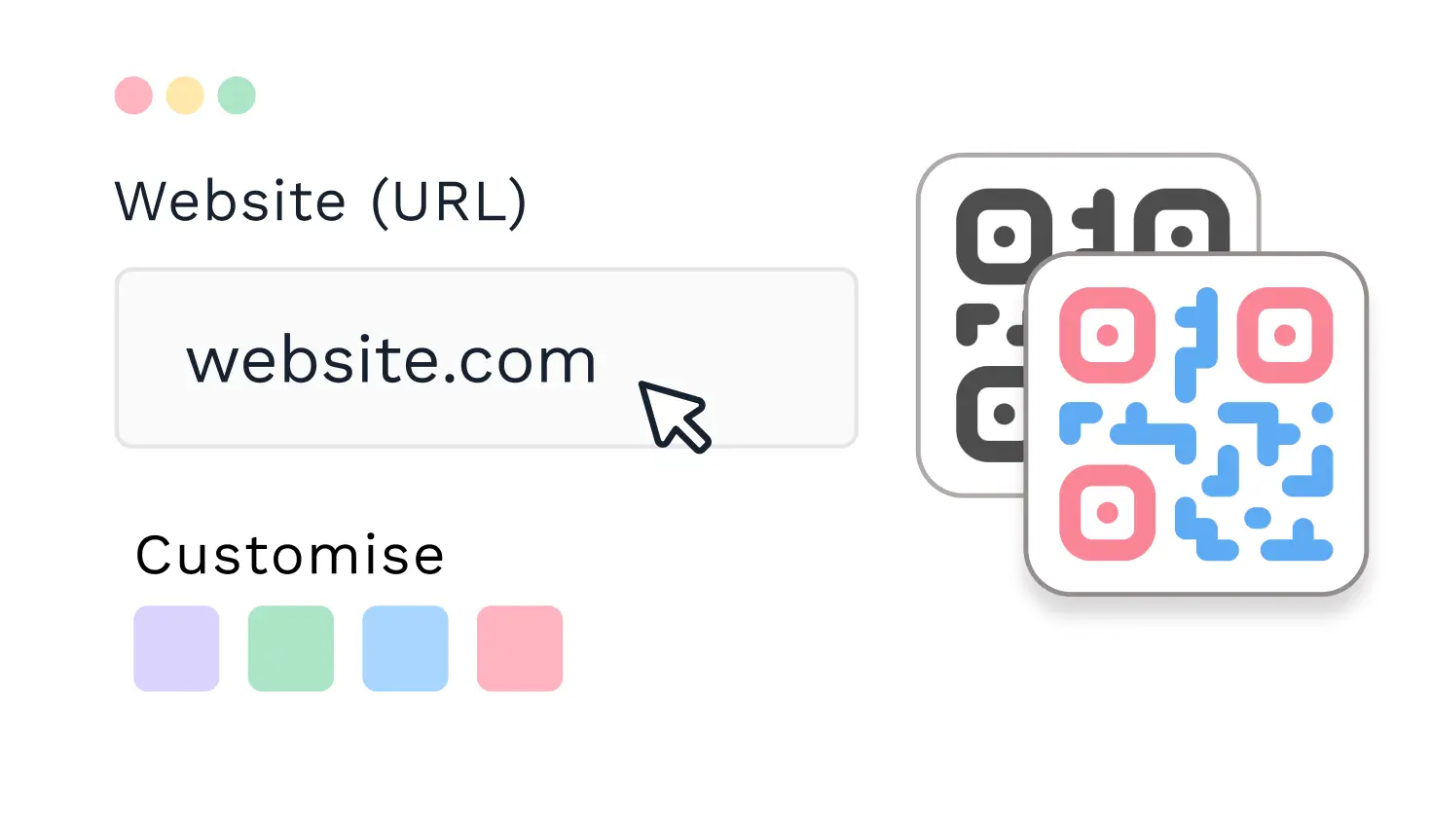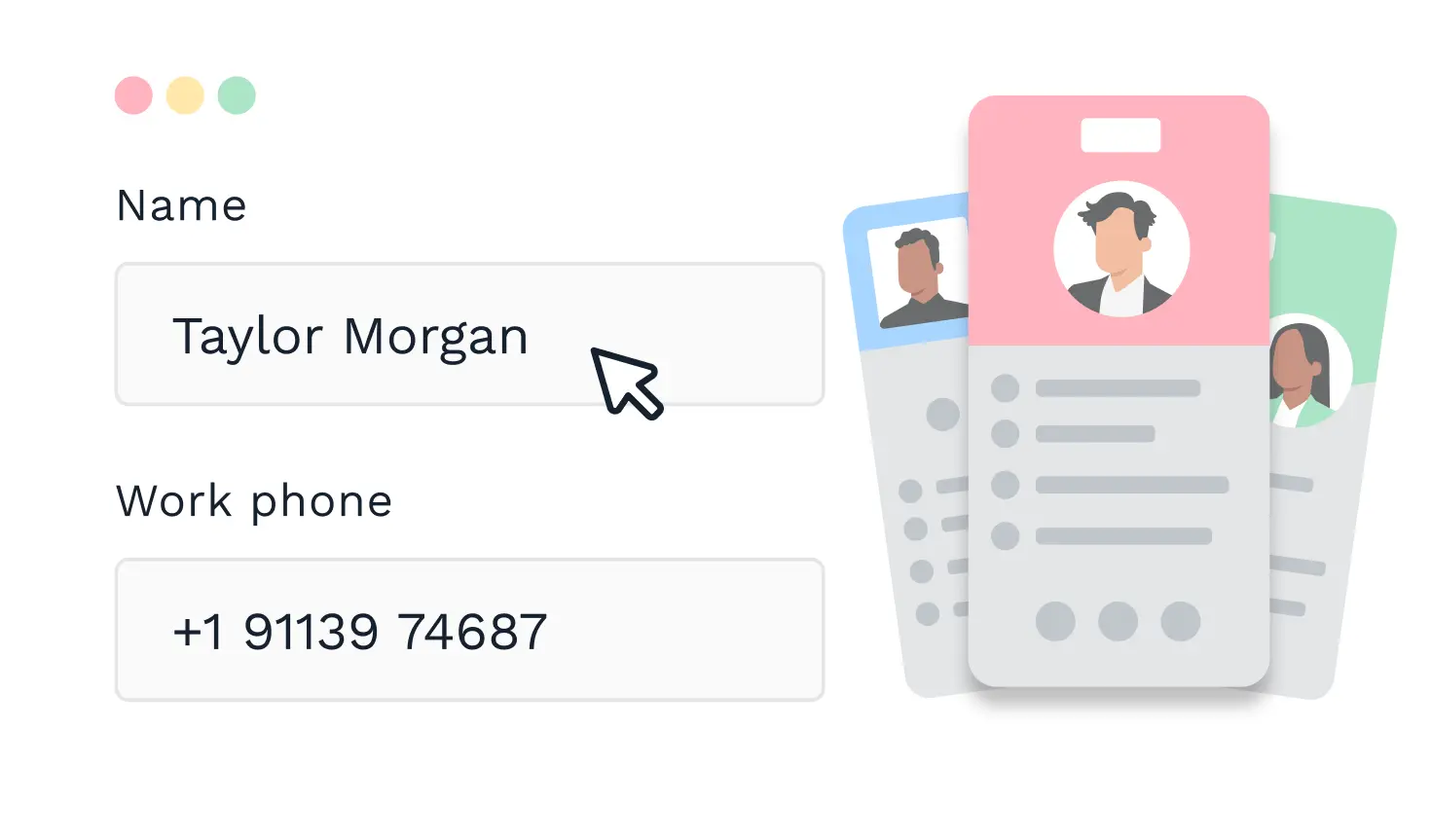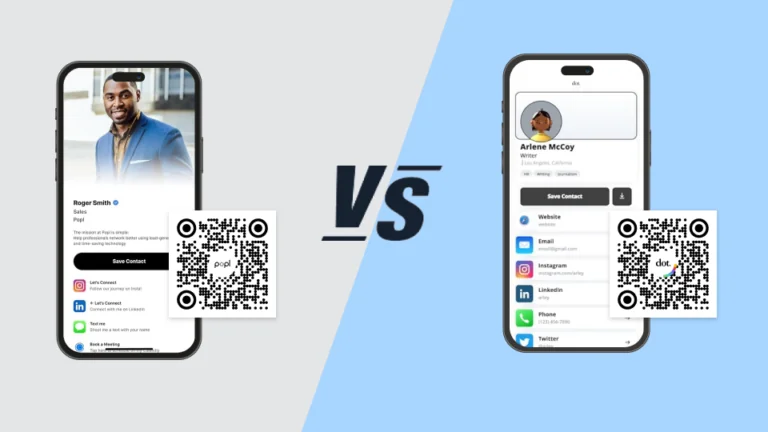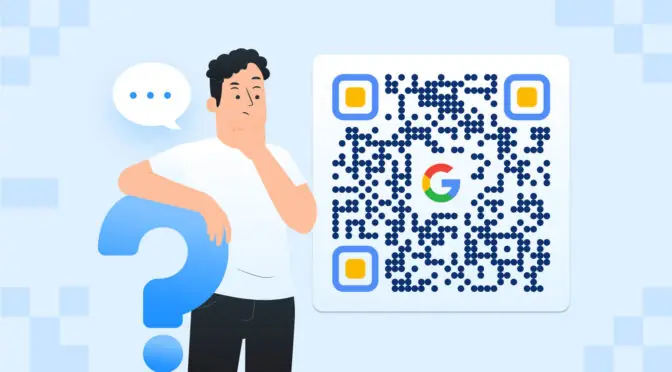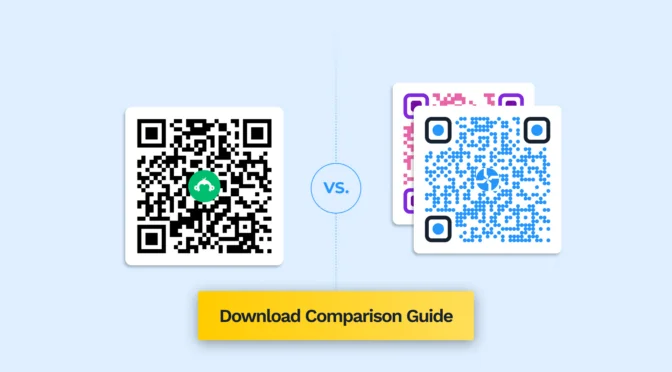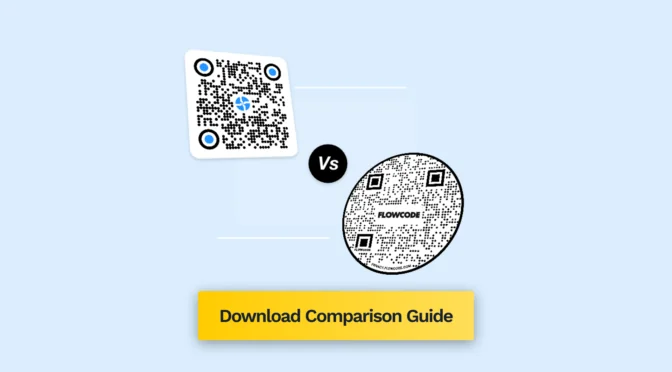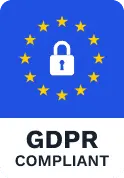You’ve finally decided to switch to a digital business card solution. And that’s a good call, considering the host of benefits you’ll get. But it also comes with the tougher call of choosing the right tool.
While researching a solution, you must’ve gone through many platforms, their long list of features, and customer reviews before landing on Popl vs. Dot.
Both the platforms, Popl and Dot, are great alternatives to paper business cards. But their offerings vary and you need the one that suits your requirements most closely.
We’ve done the homework for you!
In this extensive comparison of Popl vs. Dot, we’ll review the essential features, price points, ratings, and more. In the end, you will be better positioned to make your choice.
Table of Contents
- Popl vs. Dot: An overview
- Popl: The go-to for creating & sharing a digital business card
- Dot: A simple step up from traditional business cards
- The verdict: Which tool is best for creating digital business cards in 2024?
- FAQs
Popl vs. Dot: An overview
Popl is one of the digital business card leaders. You can create and customize your digital business card on their app or website using the platform. It’s highly-rated and customers praise its ease of use.
Dot is a simpler tool for linking your digital business profile to a physical NFC card called a “dot.device.” While the price points of both tools are comparable, Popl has the upper hand regarding features.
Evaluate the two in detail:
| Popl | Dot | |
| Best features | 1. Lead capture 2. Card management 3. Contact management |
1. Digital contact book 2. Follow-up reminders 3. On-field lead capture |
| Integrations | 1,000+ integrations via Zapier and built-in, including: 1. Zoho 2. Pardot 3. Azure 4. Microsoft Dynamics 5. Outlook 6. Hubspot 7. Salesforce |
Limited integrations that don’t include CRM. But, you can download the contact information via a CSV file. |
| Ratings | 4.8/5 (via G2) 4.7/5 (via Capterra) |
4.3/5 (via Trustpilot) |
| Customization | Color themes for digital business cards. | Custom styles include color themes, light and dark modes, and icon options. |
| Analytics and tracking | 1. Engagement and ROI metrics 2. Leads generated 3. Card views 4. Link taps 5. Contacts downloaded 6. Devices used 7. Top tapped links 8. Lead tagging and grouping |
1. Contacts exchanged 2. Contacts downloaded 3. Total link taps 4. Profile views 5. Contact map |
| Security | • GDPR • SOC 2® Type 2 Type 2 • Okta and Azure SAML 2.0 (SSO) |
• GDPR • NFC technology may be a threat to data security |
| Ease of use | Intuitive platform | Slightly complex |
| Support | 24/7 Support over call, SMS, and email | Support via help articles, chatbot, and email |
| Scalability | You can manage unlimited team members and create sub-teams | Dot cards are designed for personal use and lack team management features |
| Ability to share | 1. URL 2. QR Code 3. Apple Wallet and Google Wallet 4. Email Signature 5. Virtual background 6. iPhone widgets 7. NFC cards and tags |
1. URL 2. QR Code 3. NFC cards and tags |
| Pricing | • Basic: Free (limited features) • Pro: $7.99/month • Pro+: $14.99/month • Dynamic pricing for teams |
• dot.Profile: Free • dot.Profile Plus: $10/month • dot.card: $20 |
Popl: The go-to for creating & sharing a digital business card
Popl should be your go-to if you prioritize convenience in creating and sharing your digital business cards:
🖌️Create a custom digital business card
With a simple, intuitive UI, it’s easy to choose a color theme, add social media, phone, email icons, and your brand’s logo to your digital business card—all in under five minutes.

The layout and white labeling of the digital business card add a professional touch to your virtual and on-ground networking efforts.
Dot offers a real-time, step-by-step guide to creating a digital contact card or the “dot.Profile”, but many users have complained that the process isn’t as simple as it seems.
You have to turn on a few features before adding them to the card. Plus, there is a 35-letter limit to the information you can share under each section (even the bio!).

🤝 Sharing
Popl takes the cake when it comes to sharing. You’ve got multiple options:
- Links
- QR Codes
- Apple Wallet and Google Wallet
- iPhone widgets
- Virtual backgrounds
- Email signatures
Popl also offers NFC accessories that you can tap to share your digital contact card.
Overall, Popl is a good option for mid to large businesses with growing teams.
On the other hand, Dot is limited to a link, NFC devices, and a QR Code. With Dot’s focus on NFC tap-and-share technology, the experience isn’t as smooth as Popl’s when sharing contact information digitally.
If you need a simpler solution focusing on NFC technology and physical devices for offline events, you might prefer Dot. The free dot.Profile with an NFC dot.card or dot.classic (an adhesive to stick on your phone) is a more cost-effective solution.
Dot: A simple step up from traditional business cards
Limited features aren’t a con, especially if you don’t need the extra features that Popl offers. In that regard, Dot is for individuals or small businesses who need a simple, no-fuss, scan/tap card for in-person events.
🤝 No-fuss lead collection
You can collect leads at events, trade shows, or on-field sales visits with Dot. While the physical cards and tags aren’t customizable, you can still edit the digital business card or your virtual contact profile.

🧑🏫 Contact Management
Dot has a simple digital address book that allows you to save the contact information and download it as a CSV. It doesn’t provide integrations to any CRM or contact management tools since its main intent is to collect and exchange contacts.
However, you can set up follow-up reminders to interact with your prospects.

Popl is more suitable for businesses with a bigger sales or networking team since you can attribute leads to representatives and manage the ROI from events, teams, and devices.
Popl also offers many more in-built and third-party integrations for businesses—something Dot doesn’t offer.
Now that you’ve seen the tools up close, you might be closer to deciding. However, compared to alternatives to Popl and Dot, both tools fall short on several aspects.
What do Popl and Dot digital business cards lack?
No platform can have every feature and be the best at it. Popl and Dot provide almost all the features, but there is scope for improvement in the following areas:
- Data privacy and security
- Advanced analytics
- Ready-to-use templates
These features may be essential for your business based on what you intend to do with your digital business card. Take a look at how:
- Data privacy and security
With Popl and Dot you can create digital business cards, but the platforms encourage using NFC devices (cards, tags, watches, etc.) to share your profile.
In general, NFC cards aren’t as secure as swapping contacts digitally. This is because it is possible to intercept the signals between a phone and an NFC card, putting the user’s and their prospect’s personal details at risk.
Do note that Popl has more features than Dot to help you create a fully digital business card without any PVC or metal cards.
☠️ Consider this
NFC business cards aren’t a good idea if your business requires enterprise-grade security. Choose a 100% digital, security-focused business card solution like Uniqode (👋 that’s us) made for enterprises.
Get industry-leading security measures and peace of mind for all your networking measures:
- Multi-factor authentication (MFA)
- Phishing URL detection
- Compliance with data privacy laws (such as GDPR, SOC® 2)
- Single Sign-On or SSO login
- Password-protected digital business cards
- Admin control over team member cards
- Central management and role-based access
Get industry-leading data security for digital business cards (all mentioned above and more) with Uniqode.
- Advanced analytics
Every interaction with a lead or a prospect is a chance to personalize your next interaction with them. Even if you’re an individual, such as a freelancer or a working professional, a few card metrics and analytics can help you identify the best-performing links, number of saves, and more.
Dot has the basic analytics in place, and Popl is one step ahead with more in-depth insights into measuring and forecasting performance.
🔥See more than just card scan numbers with Uniqode
- Card scans by GPS location
- Card scans by device OS
- Card scans by IPS address
- Time periods with the maximum scans
- Integration with Google Analytics

- Ready-to-use templates
If you’re implementing digital business cards as an organization-wide solution, you will need a platform with ready-to-use, custom templates.
You can customize your digital business cards and white-label on Popl and Dot. But, both tools have their limitations:
- Dot’s NFC devices come in one standard design, which you can’t edit
- Popl’s design capabilities are limited in bulk packages, meaning, they’re not for scalability
Regarding ready-to-use templates, there are limited options for Popl and Dot.
🔥Pro tip: Choose from ready-to-use templates you can customize
Get a customizable, ready-to-use template that suits your brand. Uniqode offers not one but multiple digital business card templates which you can edit till they match your brand’s colors, font, and overall esthetic.

👑 The verdict: Which tool is best for creating digital business cards in 2024?
Based on our evaluation, Popl is a better tool for creating digital business cards for mid to large organizations. These Popl features stood out in our review:
- Team management
- Integration capabilities
- Value-for-money for the features offered
Popl also offers a smart business card solution using NFC technology.

Remember that Dot is not a good option if you interact with prospects virtually, since there are limited options to share digitally. However, do note that:
Dot is more suited for small businesses or personal use
- It is the simplest alternative to a paper business card for in-person interactions
- It doesn’t require any technological know-how to set it up
After a complete overview of these two tools, if platform security, analytics, and editable templates are a priority for your business, you can give Uniqode a shot!
The 14-day trial is free and doesn’t require a credit card to sign up!

FAQs
1. What is the difference between Popl and Dot?
Popl is a better digital business card for sharing virtual contact profiles via links, QR Codes, and Apple Wallet or Google Wallets. While Dot offers a digital business card, it is more suited for teams who need a customizable NFC device to share contacts in person.
2. Is Dot card worth it?
Dot is an affordable smart business card but with its limited features and functionality, users don’t consider it worth the cost. Especially when compared to digital business cards such as Uniqode, Popl, and LinQ.
3. Does Popl have a monthly fee?
The basic version of Popl allows you to create digital business cards for free. But, the Pro and Pro+ plans have a monthly subscription fee of $7.99 and $14.99, respectively.
Kritika is a Senior Content Marketer at Uniqode. She’s exploring the effectiveness of digital business cards in increasing the ROI of networking for fast-growing businesses.


